Managers of apartment complexes are magnets for complaints and conflicts in need of solutions and mediation. To keep thousands of people safe and content, they are supposed to display a special set of skills.
Lee Sang-yong, the manager of an apartment complex of 510 units, arrives for his interview 30 minutes later than scheduled. He’d called to request the delay. An urgent matter had arisen; a resident had made a noise complaint to the supervisor of a nearby construction site.
After rushing to keep the confrontation from boiling over, Lee hurries back, barely taking a breath. “It’s pretty much always like this. After all, I’m the one they come to with problems and complaints,” he says.
Sixty-two percent of South Korea’s population lives in apartments. The managers of apartment complexes must ensure everyone is content with their mini-community – no small feat considering the range of priorities, tolerance levels and demands found among hundreds, often thousands, of residents. Resolving conflicts and complaints comes with the territory. And that requires superb “people skills” as well as the administrative diligence to maintain a safe, clean environment.
Before he became an apartment manager, Lee spent 32 years in the military. His motto as a commanding officer was always “1 percent is giving the order,99 percent is following up.” This military command system of keeping orders simple and making verification thorough has served him well in overseeing Hillstate, a 10-building complex nestled in Seoul’s Mapo District, overlooking the Han River.
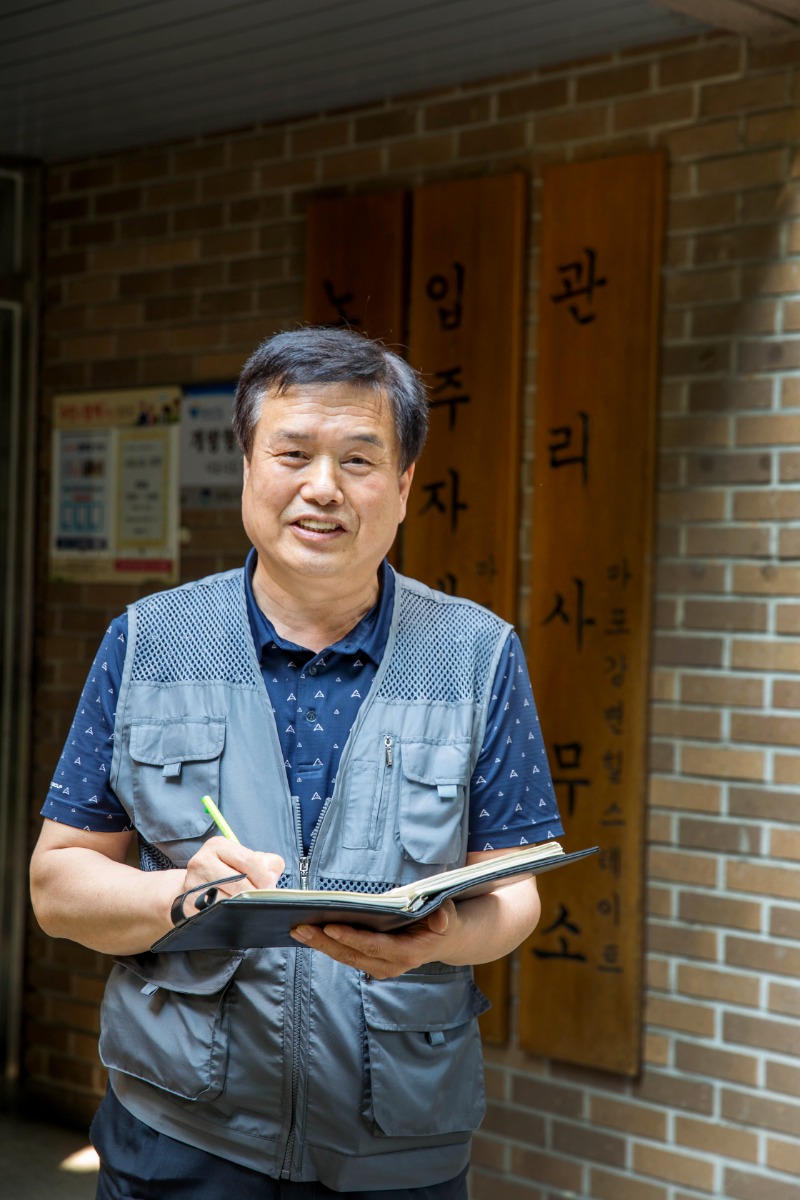
After retiring from the military as a lieutenant colonel in 2009, Lee Sang-yong began an entirely different career as the manager of the Riverside Hillstate apartment complex in Mapo District, Seoul, overlooking the Han River.
A Range of Complaints
“It’s fine when we can talk it out, but sometimes you get people who just aren’t being reasonable,” says Lee. He recalls one resident who insisted his building was sinking because the refrigerator of every unit was in the same spot, creating a perilous aggregation of weight. Unconvinced by a history of unblemished inspections since the building’s construction, the resident forced the issue on the board of resident representatives. Three specialized contractors were contacted separately and all three said nothing was wrong. “No matter how nonsensical a complaint may seem, you can’t just ignore it. You have to take steps to address it, and then inform the person who made the complaint of the outcome,” Lee says.
The most common complaint, not to mention the biggest headache, is about noise. Hillstate is in a very quiet residential area, so noise from a single unit or vehicle can be distinctive. One resident complained that vehicles simply entering and exiting his building’s garage were too noisy, refusing to recognize that it was communal area that couldn’t be entirely subject to personal whims.
A few weeks before the interview, a resident complained that children living on the floor above were so noisy that he couldn’t fall asleep. A security guard contacted the household in question only to be scolded for calling at such a late hour. Lee says he was quite perturbed.
“I can understand the upstairs resident’s perspective, of course, but what else was the guard supposed to do? When it comes to noise complaints like that between units, in many cases there’s honestly not much that can be done. Sometimes it’s not even clear whether it’s the unit directly overhead or not. Plus, hearing that your downstairs neighbor is complaining about you can cause bad blood, so I train my employees to be careful with their phrasing in a lot of different ways.”
Up to the 1980s, becoming a housing manager was done casually, with property owners hiring acquaintances who would learn the job on the fly. Today, an examination must be passed. Some 1,500-2,000 people succeed in the exam each year, but without the proper personality and social skills there is no job.Those who qualify must also accrue at least three years of experience managing an apartment complex of fewer than 500 units before they can work at a complex larger than that.
Military to Management
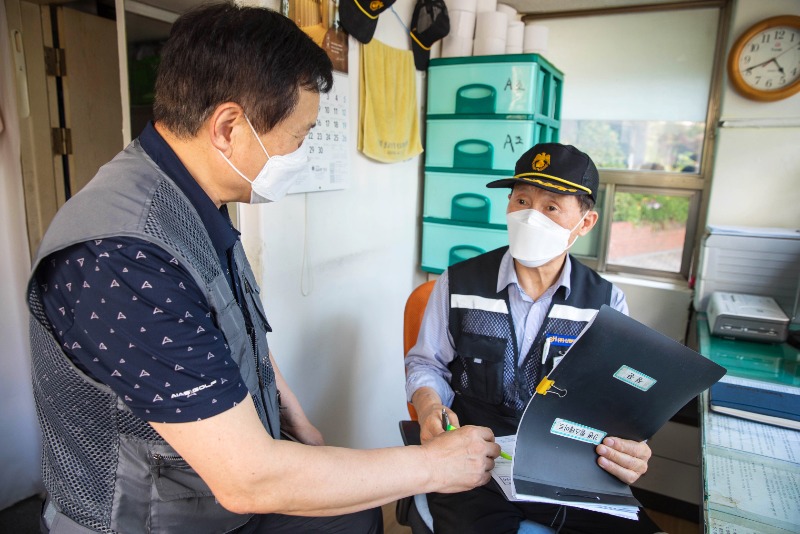
Lee supervises 15 employees, including security guards, cleaners, administrators and a bookkeeper. He tries to maintain an open line of communication with residents and employees alike.
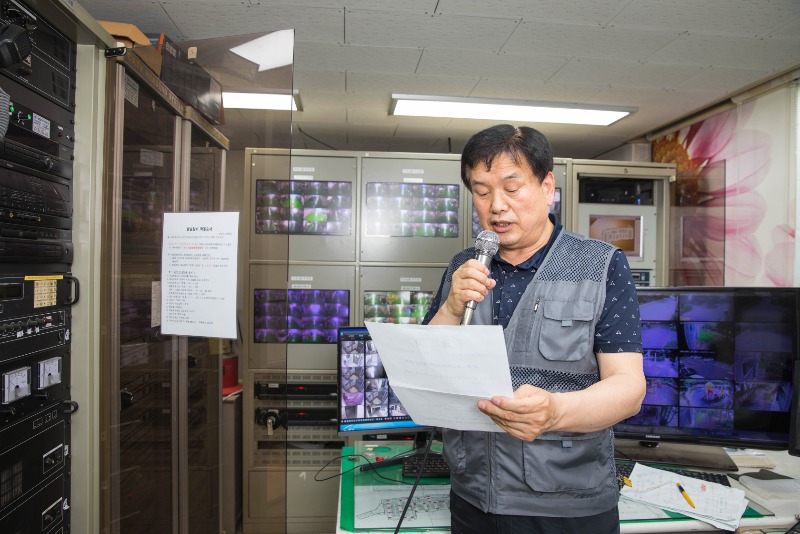
Lee’s workdays are both repetitive and highly structured. His duties include making complex-wide intercom announcements, which have increased in frequency with the COVID-19 pandemic impacting procedures.
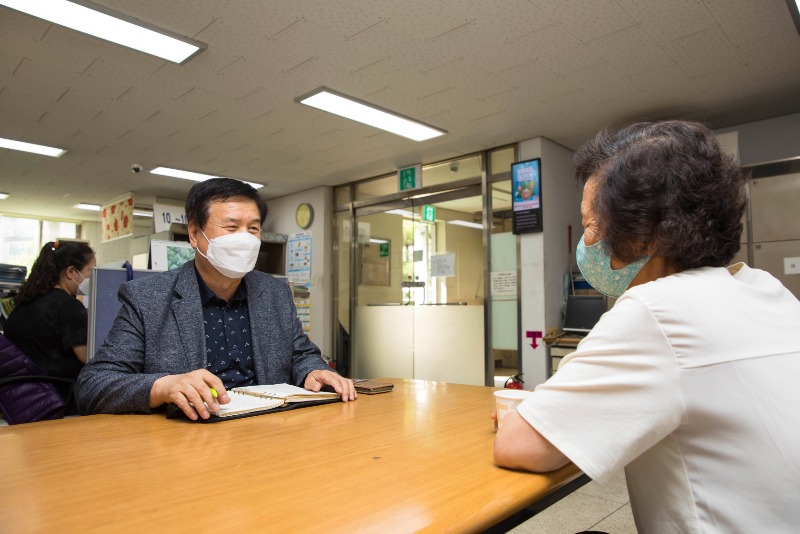
Each day, from morning to night, residents approach Lee with specific issues to resolve. Listening intently, he suggests solutions based on a full understanding of the residents’ perspectives.
After Lee retired as a lieutenant colonel in June 2009, an acquaintance suggested that he take the exam for housing management certification, thinking that it might suit his personality. Lee received his certification in 2011 and started his new career the following year at a complex that had 250 units. Seven years later, he moved to his current complex, which has a mix of singles and families in units that are comparatively spacious.
“One good thing about this job is that there’s no retirement age,” says Lee. This doesn’t mean that everyone can keep working into their old age. While getting older doesn’t necessarily translate to no longer being good at your job, there are residents who think differently. Young people have lots of ideas but not enough experience; by contrast, older people can tell what’s wrong with a machine on the fritz just by listening to it, but they tend to resist change. There are pros and cons to both, Lee says.
Lee’s workday officially begins at 9 a.m., but it actually starts at 8:05. Accustomed to rising early from his military years, he awakens automatically at 5 every morning.
“On Mondays, Tuesdays and Fridays, I don’t come directly to my office but make a round of the complex first,” he says. “On Monday, it’s to make sure nothing happened over the weekend; on Tuesday, it’s to check in after the recycling company has been through here to make sure everything is all cleaned up; and on Friday, it’s to give everything a look over before taking off for the weekend.”
Empathy and Patience
Asked if there was ever a moment when he wanted to quit, Lee replies, “I can’t say that it’s never happened.” It’s not so much the difficulty of the work that riles him; it’s when residents are unreasonable and demand the impossible. When helplessly exasperated, irate residents invariably declare, “I pay your wages!” That’s when Lee is overcome with sadness. He then steps back to calm himself. After a kind of mind controlling period, a solution is usually agreed upon.Fortunately, the current complex doesn’t have any extreme bullies. Indeed, what it does have is a great deal to celebrate.
Many residents offer up snacks and beverages when they see staff members working around the complex. One household in particular pays a fruit vendor 60,000 won every Tuesday to provide fruit to the complex’s six security guards and five cleaners. This amounts to annual expenditures of over three million won that has been done since before Lee arrived. “I’ve heard that it started with the parents, and now the daughter is keeping the tradition going,” he says. When he visited the household to express thanks, the family humbly requested anonymity.
Lee leaves for the subway at 6 p.m. and arrives home shortly before 7. By 10:30 p.m., he’s usually in bed. Weekends are spent going out to eat something tasty with his family, watching his favorite baduk (go) TV show, or heading to the outskirts of the city to visit relatives and help tend their vegetable gardens. Born in the countryside, he grew up helping his father with farm work. Even today, spending time working the land helps ease his mind.
When asked what qualities are most important for a head manager to have, Lee chooses empathy and patience. As the work involves dealing directly with people, one must be able to meet them with understanding and consideration, and to control one’s own temper. Thanks to his generosity of spirit and tireless attention, the complex stays well centered.
Last year, many residents volunteered to help plant flowers by the front gate. Afterward, they gathered to enjoy rice wine and chat in the complex courtyard. “These little moments become opportunities to find out what’s going on,” says Lee, adding that some residents are shy about broaching an issue even if it has merit.
Sometimes, as Lee makes his rounds, a resident will approach him and say, “Thank you for the other day, you were a real help, we know you work hard.” Then he thinks, “Ah, the residents do see the effort I put in. I was right to choose this path.” These are the moments that make it all feel worthwhile.
Thanks to Lee’s generosity of spirit and tireless attention, the complex stays well centered.
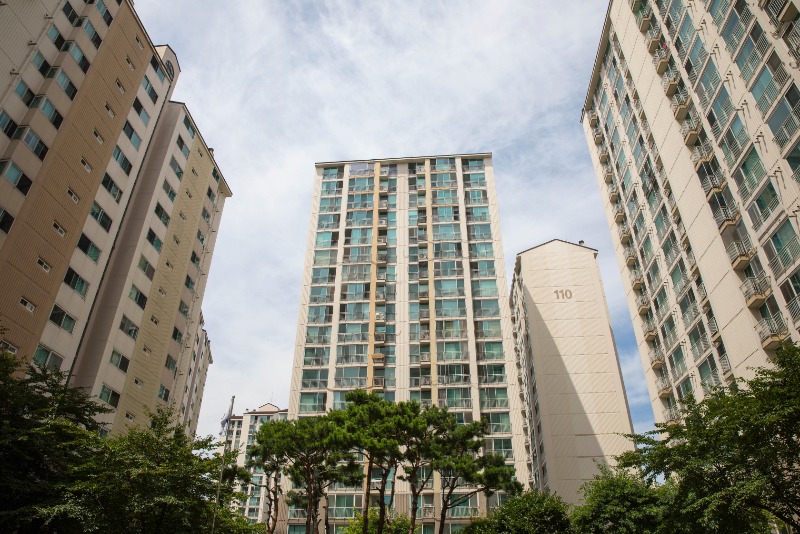
The complex that Lee manages includes 10 buildings with 510 households, yet is small compared to neighboring complexes. It is located in a forest of high-rise housing that constitutes one of the core residential districts of central Seoul’s western edge.